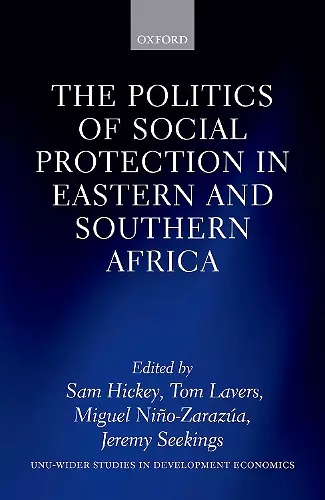The Politics of Social Protection in Eastern and Southern Africa
Miguel Niño-Zarazúa editor Jeremy Seekings editor Sam Hickey editor Tom Lavers editor
Format:Hardback
Publisher:Oxford University Press
Published:20th Nov '19
Currently unavailable, and unfortunately no date known when it will be back

The notion that social protection should be a key strategy for reducing poverty in developing countries has now been mainstreamed within international development policy and practice. Promoted as an integral dimension of the post-Washington Consensus all major international development agencies and bilateral donors now include a strong focus on social protection in their advocacy and programmatic interventions and a commitment to providing social protection was recently enshrined within the Sustainable Development Goals. The rhetoric around social protection, particularly when delivered in the form of cash transfers, has sometimes reached hyperbolic proportions with advocates seeing it as a magic bullet that can tackle multi-dimensional problems of poverty, vulnerability, and inequality and a southern-led success story that challenges the unequal power relations inherent within international aid. The Politics of Social Protection in Eastern and Southern Africa challenges the common conception that this phenomenon has been entirely driven by international development agencies, instead focusing on the critical role of political dynamics within specific African countries. It details how the power and politics at multiple levels of governance shapes the extent to which political elites are committed to social protection, the form that this commitment takes, and the implications that this has for future welfare regimes and state-citizen relations in Africa. It reveals how international pressures only take hold when they become aligned with the incentives and ideas of ruling elites in particular contexts. It shows how elections, the politics of clientelism, political ideologies, and elite perceptions all play powerful roles in shaping when countries adopt social protection and at what levels, which groups receive benefits, and how programmes are delivered.
Based on outstanding multi-country research programmes at Cape Town, Manchester and UNU-WIDER, the contributions collected in this volume skilfully lay bare the politics of social assistance in sub-Saharan Africa, and the research toolbox required to do so. The volume makes a huge contribution to our understanding of emerging welfare institutions in the region and will be indispensable reading for researchers and policy makers worldwide. * Armando Barrientos, Professor Emeritus in Poverty and Social Justice, University of Manchester *
The recent creation or expansion of programmes of social protection all across East and Southern Africa raises intriguing and important issues for scholars of the region's politics. This book, with its admirable combination of empirical substance and analytic clarity, is a landmark contribution to this new field. It will be a key point of reference for our discussions and debates for many years to come. * James Ferguson, Stanford University *
Economists devote a large share of their time to analyse the technical aspects of tax and social policies, and not enough time to analyse the political context in which these policies are to be adopted, often with less-than-desirable results. This excellent book helps to redress that imbalance. Through various case studies in Eastern and Southern Africa, it shows why an understanding of the political and institutional context in which policies are to be applied is as important for development results as are the technicalities of the policies themselves. * Santiago Levy, Senior Fellow, Brookings Institution *
Social protection research has been preoccupied with operational questions. How to improve programme design? How to build efficient systems? Do cash transfers work? Today researchers ask more fundamental questions. Where did social protection come from? How did cash transfers spread through Africa so rapidly? Which institutions promoted social protection, and why? This engaging book provides fascinating insights and answers to these important questions, drawing on in-depth analysis of social protection policy processes in eight African countries. An indispensable read for everyone interested in social policy. * Stephen Devereux, Institute of Development Studies, Brighton, and University of the Western Cape, Cape Town *
The expansion of social protection systems requires a fundamental reconsideration of our understanding of social development. This book takes on this challenge, providing rich theoretical and empirical analyses of the political, ideational, economic and transnational forces shaping these important policy shifts. It will become a significant landmark in the study of social welfare policy and will greatly influence the next generation of research on social welfare and inclusive development in the Global South. * Sarah M. Brooks, Ohio State University *
ISBN: 9780198850342
Dimensions: 235mm x 161mm x 23mm
Weight: 614g
310 pages